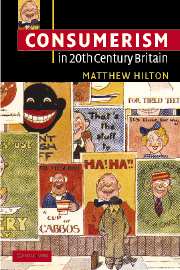Book contents
- Frontmatter
- Contents
- List of illustrations
- Acknowledgements
- List of abbreviations
- Introduction: luxury's shadow
- Part I Necessity
- Part II Affluence
- 6 The new consumer: good housewives and enlightened businessmen
- 7 The professionals: the origins of the organised consumer movement
- 8 Individualism enshrined: the state and the consumer in the 1960s
- 9 The right to shop: consumerism and the economy
- 10 The duty of citizens: consumerism and society
- 11 Affluence or effluence: globalisation and ethical consumerism
- Conclusion: the quantity or the quality of choice
- Bibliography
- Index
7 - The professionals: the origins of the organised consumer movement
Published online by Cambridge University Press: 10 December 2009
- Frontmatter
- Contents
- List of illustrations
- Acknowledgements
- List of abbreviations
- Introduction: luxury's shadow
- Part I Necessity
- Part II Affluence
- 6 The new consumer: good housewives and enlightened businessmen
- 7 The professionals: the origins of the organised consumer movement
- 8 Individualism enshrined: the state and the consumer in the 1960s
- 9 The right to shop: consumerism and the economy
- 10 The duty of citizens: consumerism and society
- 11 Affluence or effluence: globalisation and ethical consumerism
- Conclusion: the quantity or the quality of choice
- Bibliography
- Index
Summary
Today, the Consumers' Association (CA) is regarded as a national institution. It is celebrated for its comparative testing of the value for money of different branded goods in its Which? magazine and its recommendation of the ‘best buy’. It is called upon by government departments to advise on all matters of consumer affairs. It lobbies Parliament and other official bodies to introduce legislation furthering the interests of the consumer. And it is the first port of call for anyone in the media wishing to obtain a consumer's perspective on any particular economic development. Since its inception in 1956 and the launch of Which? the following year, it has run itself as a private, though non-profit-making, company catering to the interests of its paying subscribers. Its success has been dependent on its efficient operation as a business and its efforts to market itself effectively, yet it retains as well the feel of a forward-thinking social movement which was clearly foremost in the minds of many of its founders. This idealist spirit has pervaded the CA's image of itself and, as with all social movements, certain apocryphal stories have emerged of its origins. In the CA's case, and as many of its leaders like to recount, it was an organisation that began in a garage.
Original staff and Council members of the CA like to stress the gung-ho, let's-give-it-a-go ethos of the early years.
- Type
- Chapter
- Information
- Consumerism in Twentieth-Century BritainThe Search for a Historical Movement, pp. 194 - 218Publisher: Cambridge University PressPrint publication year: 2003

